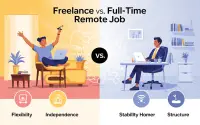10 Reason Why Jobs will going to be Tougher in Future
1. Automation & AI Expansion
Automation and AI are rapidly advancing, reshaping industries and job markets globally. These technologies perform tasks ranging from simple to complex, including roles traditionally held by professionals in various sectors. As they evolve, the line between tasks that require human interaction and those that can be automated blurs. This poses challenges by changing job availability but also creates opportunities for new roles centered on the maintenance, management, and ethical considerations of AI systems.
You need to understand many repetitive nature task will become obsolete, many old and existing jobs, like cashier, data entry jobs, office assistant will be taken by automation, many supermarket have already implemented cashless point of sales
The expansion of automation and AI necessitates adaptability in workforce skills. Workers must embrace lifelong learning, and industries are urged to invest in reskilling and upskilling initiatives. This helps individuals stay relevant and benefits organizations by expanding their talent pool.
2. Climate Change Impact
Climate change presents a multifaceted challenge to the global economy. Severe weather events, rising sea levels, and shifting climate patterns profoundly affect sectors like agriculture, insurance, and construction. These industries must reimagine how they operate within an evolving environmental framework. The ramifications include a transformation of work practices and shifts in market demands and insurance models to mitigate risks.
For workers in these sectors, adaptability is key. They must acquire new skills and knowledge, such as modern agricultural practices and innovative construction methods. The insurance industry faces the challenge of recalibrating its risk assessment models to account for increased frequency and severity of natural disasters.
Yet, with these challenges come opportunities for growth and innovation. Developing sustainable techniques not only addresses concerns but also opens up new markets. There is a growing demand for construction that incorporates resilient and sustainable design.
These complex changes needs to address for this individual needs to regularly update themselves and seek knowledge and technique for reducing their environmental footprints, By doing so, they contribute to broader societal adaptation while securing their economic futures

3. Gig Economy Growth
The gig economy’s expansion is redefining the traditional employment landscape. As we witness a shift from stable, full-time positions to more fragmented, gig-based work and remote work the implications for job security and employee benefits become increasingly complex. This transformation reshapes how individuals approach their careers, prioritize work-life balance, and manage financial stability.
Job market is always evolving, adaptability and flexibility are crucial for workers. Those who can navigate the gig economy’s uncertainties are better positioned to capitalize on its opportunities. However, the trade-off often involves a lack of traditional employment benefits, sometime individuals needs a kick from their organization to get going such as deadlines, rewards, this is not something you will find in gig-based work, in simple terms you need to have strong mental nerves to get going each day.
As the gig economy continues growing, regulatory frameworks are beginning to catch up, aiming to provide gig workers with greater protections while preserving flexibility. This includes efforts to ensure fair wages, reasonable conditions, and access to benefits.
Navigating the gig economy necessitates a balancing act. For workers, it means cultivating resilience and a diverse skill set. For businesses, it requires innovative management strategies. And for policymakers, it involves creating regulations that protect workers’ rights without stifling innovation.
4. Remote Work Normalization
As the world leans more towards digital operations, the normalization of remote work emerges as a significant shift in the professional domain. This change stems from technological advancements and societal adjustments. Remote work heralds a new era of work-life integration, offering flexibility but also ushering in unique challenges.
Remote Work was always existed but we have seen the boom after the pandemic and when companies realizes they can significantly lower the operating cost and there are many other benefits as well, we now see the rise of remote jobs offering.
Remote work involves a departure from traditional office environments. It necessitates reliance on digital communication tools and self-regulation to maintain productivity. Companies must rethink operational and managerial strategies to ensure team cohesion and project alignment in a virtual setting. For employees, the adjustment encompasses developing self-discipline, enhancing time management, and navigating technological platforms effectively.
Old school workers must need to adapt, remote works involves technological knowhow so this knowledge is crucial for people working in their late 30s and 40s.
This trend extends beyond logistical adjustments. It touches upon deeper aspects of professional life, including potential isolation and dilution of company culture. The absence of informal interactions and face-to-face collaborations can result in feelings of disconnect and may impede spontaneous exchange of ideas.
Moreover, the blurred boundaries between personal and professional life represent a significant repercussion of remote work. The convenience of working from home simultaneously poses a risk of overwork and burnout. Achieving a balance that respects personal time while meeting professional commitments is a central focus for remote workers.
The transformation to remote work propels us towards reimagining the architecture of the workplace. It necessitates a blend of adaptive strategies, technological empowerment, and emphasis on mental health and employee engagement. As businesses and individuals move forward, the focus is on crafting meaningful work experiences that resonate in a digitally connected, physically distant world.
5. Skills Gap.
Technology is moving very fast, while driving economic growth and productivity, concurrently inaugurates a pronounced skills gap. This chasm widens as the demand for advanced technical skills surges, juxtaposed against the current capabilities of the workforce. The dichotomy between the skills possessed by workers and those required by employers becomes increasingly stark, posing a critical challenge to sustaining job relevance over time.
In navigating this terrain, the significance of upskilling and reskilling is need of this era for all the workers. These processes entail not merely acquiring new skills but embody a profound transformation in the approach to learning and career development. Upskilling refers to the enhancement of existing skill sets to align with the evolving demands of one’s current role, whereas reskilling represents the acquisition of entirely new skills aimed at transitioning to a different job or industry. Together, they forge a pathway for individuals and organizations to adapt and thrive in an environment characterized by rapid technological change.
The skills gap underscores a crucial reality: continuous learning emerges as a non-negotiable element of professional life. The concept of a finite education dissipates in the face of lifelong learning as a requisite for career progression and resilience. Workers are compelled to perpetually reinvent their skill sets to navigate the vicissitudes of the job market.
Organizations play a pivotal role in this landscape, bearing a responsibility to cultivate a culture that champions continuous learning. By investing in training programs, mentorship, and access to learning resources, companies can foster an environment that not only bridges the skills gap but also enhances employee engagement and innovation. Even if the company is not doing so you can do it by yourself in this era of technology and can upskill yourself pretty easily and cheaply you just need to be smart.
As the skills gap continues to expand, it accentuates the transformative potential of upskilling and reskilling in sculpting the workforce of tomorrow. The trajectory towards an economy brimming with high-skill opportunities necessitates a cooperative effort between employers and employees to champion the ethos of lifelong learning.

6. Cybersecurity Threats
As technology intertwines more deeply with almost every facet of daily and professional life, cybersecurity becomes a necessity. As our existence bends more towards a digital dimension, cybersecurity threats proliferate at an unprecedented rate, presenting challenges that span across sectors and professions.
Cybersecurity is an area which still most people in today’s world not understand it easily, its complexities, how to handle the threats according to the environment it’s still a challenging task, but it needs to be addressed no matter what.
This surge in cyber threats elevates the importance of digital vigilance, extending the domain of cybersecurity into virtually every job role. Professions ranging from healthcare and finance to education and retail now confront the reality that cybersecurity is integral to their operations. What used to be considered a niche responsibility is now a universal imperative.
The enhancement of cybersecurity measures implicates not only the need for robust IT infrastructures but also demands a cultural shift within organizations. Employees at all levels must adopt a mindset of digital caution, aware of the implications their online activities could have on the broader organization. With cyber threats evolving in sophistication, awareness and prevention become the first line of defense.
7. Mental Health Issues:
The significance of mental health in the workplace has become increasingly pronounced. As society moves towards destigmatizing mental health issues, workplaces must evolve. This evolution is not only an ethical imperative but a structural necessity, transforming how jobs are designed, cultures are fostered, and support systems are implemented. An 8 Hour jobs for 5 days a week can make you mentally weak if the workplace is toxic.
Employees are not mere resources but whole individuals whose mental health is linked to their productivity and satisfaction. Addressing mental health is not just about mitigating risks but about unlocking potential. One key aspect involves reconfiguring the structural elements of work that contribute to stress, such as reassessing workload distributions, setting realistic expectations, and offering flexibility, and sadly all mostly overlooked in order to earn the highest revenue possible.
Cultivating an environment where employees feel empowered to speak up about their mental health without fear of stigma is crucial. It’s about creating channels for open dialogue and ensuring managerial staff are professionally trained to respond with empathy and support and they must be equip with techniques on how to minimize the stress load of an employee
Leaders set the tone for the organizational culture; their actions and attitudes toward mental health shape employee perceptions and behaviors. It’s imperative for leaders to model healthy work practices, champion well-being initiatives, and demonstrate genuine commitment to their team’s mental health,
8. Shrinking Industries
As the global economy evolves, certain industries find themselves navigating challenges. The combined forces of changing consumer preferences, automation, and globalization have led to a downward trend for some sectors. This transformation brings uncertainty for workers in declining industries, highlighting the need for adaptability and resilience.
Industries that have historically been the backbone of economies, such as manufacturing, print media, and certain aspects of retail, now face significant challenges as digital transformation reshapes market demands. In print media, the digital age has led to a shift in news consumption, reels and shorts videos have taken place to provide information quickly to user leaving traditional newspapers grappling with decreasing readership and advertising revenue.
In manufacturing, automation and robotics have introduced efficiencies but also displaced manual jobs. While these technologies drive innovation, they also impact roles that have existed for generations. E-commerce continues to reshape the retail landscape, challenging brick-and-mortar stores to innovate amid a consumer shift towards online shopping, A well decorated online shopping store can be opened for much cheaper than a traditional retail physical store.
For workers in shrinking industries, the situation calls for a reevaluation of career paths. Job security may no longer be guaranteed, necessitating a proactive approach: either adapting to new technologies within their current fields or pivoting to different sectors. Transitioning involves acquiring new skills and embracing change.
9. Global Competition
In an interconnected world, the rise of global competition reshapes the professional landscape. While fostering opportunities for collaboration and innovation, it also intensifies competition in the job market. Workers now find themselves vying for positions against a vast pool of candidates that stretches beyond their local or national confines, this has made the jobs market tougher, and you are now likely to be competing with the world
The implications of heightened competition extend beyond individual job seekers to influence wage structures and job security across industries. In certain sectors, the influx of a global talent pool may exert downward pressure on wages, as employers leverage the wider availability of qualified candidates. Simultaneously, the need for workers to continually upgrade their skills and stay abreast of industry trends has become critical with AI and machine learning it is now religiously important to upgrade your technical skills, unless you are son of a landlord.
10. Data Privacy Regulations
In this digital era where data is valuable, the emphasis on data privacy has escalated, leading to rigorous regulations across the globe. GDPR in Europe, CCPA in California, and various other frameworks worldwide prioritize consumer privacy. Regulation are becoming complex this transformation brings complexities for jobs within the tech and marketing sectors, where handling personal data is routine.
For professionals in these fields, their roles are poised for alteration. Understanding, interpreting, and implementing processes compliant with these regulations is crucial. This requirement elevates the standard for privacy expertise, transforming it into a fundamental professional competency.
Organizational strategies that encompass data collection, processing, and storage must align with legal requirements.
For technology and marketing professionals, this means continuous learning and adaptation.
Their roles evolve to not only leverage data for operational success but also safeguard it under the umbrella of evolving legislative landscapes.
The heightened emphasis on data privacy introduces the need for roles dedicated to navigating these regulation-laden waters. Data Protection Officers (DPOs), privacy analysts, compliance officers, and similar positions are becoming integral to organizational structures. Their expertise helps steer companies clear of legal repercussions and builds trust with consumers concerned about data privacy.
Each day passing new technology is being emerged, way of doing things are being completely changed things we do 20 years back is now taken by AI and Machine learning, jobs will be tougher in future new skills and technique will be needed to compete globally, individual need to act smart, he/she should embrace adaptability and flexibility with a clear and positive mindset.



